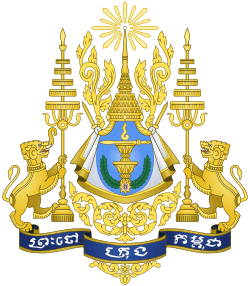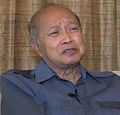Cambodian general election, 2018
| | |||||||||||||||||||||||||||||||||||||||||||
| |||||||||||||||||||||||||||||||||||||||||||
| |||||||||||||||||||||||||||||||||||||||||||
| |||||||||||||||||||||||||||||||||||||||||||
 |
| This article is part of a series on the politics and government of Cambodia |
|
Monarchy |
|
Government
|
|
|
| Foreign relations |
|
Related issues
|
|
Politics portal |
Early general elections are due to be held in Cambodia by February 2018,[1] to elect members of the sixth National Assembly. Incumbent Prime Minister Hun Sen is eligible to seek a fifth term in office.
Background
The previous election saw the fourth victory of the Cambodian People's Party, gaining 68 seats of the National Assembly and the opposition Cambodia National Rescue Party occupying the rest of the 55 seats. Despite their huge gain in seats, the opposition denied the results and accused the ruling party of poll fraud. As a result, the CNRP boycotted parliament in September 2013 and vows not to enter parliament until a legitimate electoral reform.[2] The disputed election results led to the outbreak of widespread anti-government protests.[3]
On 10 April 2014, prime minister Hun Sen agreed to hold the election five months early in February 2018. The opposition however rejected and wants the election to be held as early as 2015 or mid 2016.[1] On 22 July 2014, the political crisis officially ended and the opposition agreed to accept their seats in parliament. The next election was also agreed to be held in 2018.[4]
References
- ↑ 1.0 1.1 "Hun Sen Agrees to Hold Early Election, Wants Deal Signed Before King". Radio Free Asia. 10 April 2014. Retrieved 9 July 2014.
- ↑ Heng Reaksmey and Men Kimseng (7 March 2014). "Opposition Standing Firm on Election Reform Demand". Voice of America. Retrieved 18 July 2014.
- ↑ Dara, Mech (23 December 2013). "CNRP Holds Biggest Demonstration in Decades". The Cambodia Daily. Retrieved 18 July 2014.
- ↑ "Political deadlock broken". The Phnom Penh Post. 22 July 2014. Retrieved 24 July 2014.
| ||||||||||||||||||
.jpg)
.jpg)
